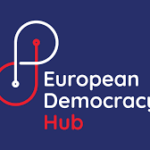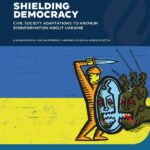The actions taken and the lessons learned in Ukraine will inform larger efforts to reinforce democracies against external aggression, argues Iulian Romanyshyn, a senior fellow at the University of Bonn’s Center for Advanced Security, Strategic and Integration Studies.
In the past, Russia regarded Ukraine as a testing ground for its hybrid warfare activities before exporting them to the West. Ukraine now has the potential to be a model of total democratic resilience that the EU can promote to counter Russian and other autocratic interference in Eastern Europe and the Western Balkans, he writes for Carnegie’s Democracy Hub.
 Yale historian Timothy Snyder says that at the time of the invasion of Ukraine, there had been a tendency to treat Russia as though it were merely a failed or corrupted version of a western liberal democracy, The Guardian reports:
Yale historian Timothy Snyder says that at the time of the invasion of Ukraine, there had been a tendency to treat Russia as though it were merely a failed or corrupted version of a western liberal democracy, The Guardian reports:
“Both the American and the German view of Putin was about denied agency. They’re like, ‘Oh, well, they’re trying to have a transition, but it’s hard for them, poor souls, therefore they have to invade Georgia or Ukraine.’” By contrast, he said, “if you say Putin is a guy who reads, and changes, and pulls in ideas, you’re saying, ‘OK, he’s not an idiot. He’s not predictable. He makes moves we wouldn’t expect.’” This is one of the reasons Snyder insists on calling Putin fascist: “It sounds weird, but to say that he is influenced by fascism is to give him credit. He’s not just a historically determined piece in this story of transitions. He’s been doing something different for more than a decade.”
In Ukraine, the Ukrainians are the ones doing the fighting, and tragically the dying; the United States has no soldiers on the ground, David J. Kramer, John Herbst, and William Taylor observe. But we have every interest in providing the military support Ukraine needs to win this war and drive every Russian occupying and invading force off Ukrainian territory, they write for The Atlantic:
No one wants the war to end sooner than the Ukrainians, but they also believe, and with good reason, that they can w in, if they get the assistance they need soon. Now is not the time to snatch Russian defeat from Ukraine’s jaws of victory….Zelensky, who has performed heroically throughout the war, was democratically elected and has to take into account the views of the Ukrainian people. A recent poll by the International Republican Institute shows that 97 percent of Ukrainians think they can win the war and 74 percent believe that Ukraine will maintain all territories from within its internationally recognized borders defined in 1991. RTWT
in, if they get the assistance they need soon. Now is not the time to snatch Russian defeat from Ukraine’s jaws of victory….Zelensky, who has performed heroically throughout the war, was democratically elected and has to take into account the views of the Ukrainian people. A recent poll by the International Republican Institute shows that 97 percent of Ukrainians think they can win the war and 74 percent believe that Ukraine will maintain all territories from within its internationally recognized borders defined in 1991. RTWT
Also in Ukraine, more than 20 organizations, along with the National Democratic Institute in Washington, had created a disinformation debunking hub in 2019 that has played a key role in the battle against the onslaught of lies, The Washington Post adds:
 A recent report from the International Forum for Democratic Studies at the National Endowment for Democracy identified three major efforts that paid off for Ukraine in the fight against Russian disinformation as war began. One was “deep preparation” (since Russia was recycling old claims from 2014, they were ready); active and rapid cooperation of civil society groups; and use of technology, such as artificial intelligence and machine learning, to help sift through the torrents of Russian disinformation and rapidly spot malign narratives.
A recent report from the International Forum for Democratic Studies at the National Endowment for Democracy identified three major efforts that paid off for Ukraine in the fight against Russian disinformation as war began. One was “deep preparation” (since Russia was recycling old claims from 2014, they were ready); active and rapid cooperation of civil society groups; and use of technology, such as artificial intelligence and machine learning, to help sift through the torrents of Russian disinformation and rapidly spot malign narratives.







